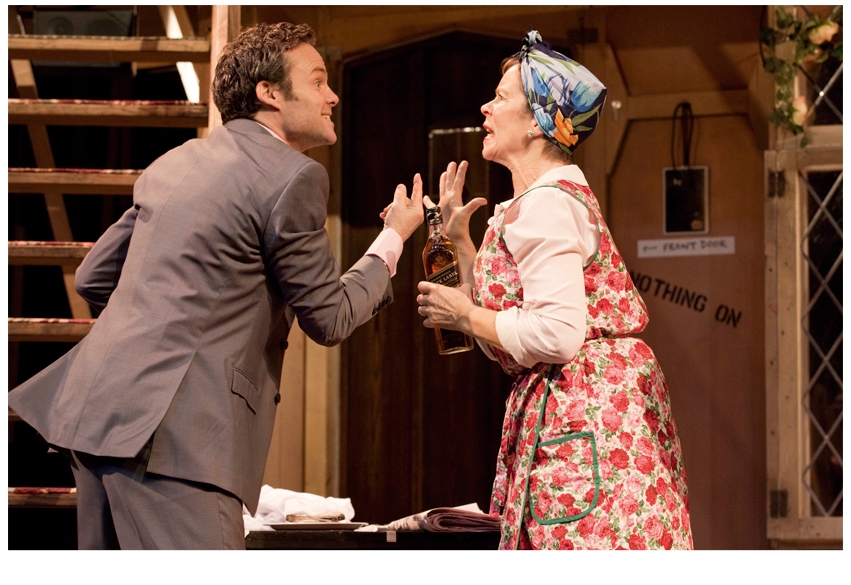Frank Rich loved it. ‘Noises Off,’ said the great N’Yawk critic, ‘is, was and always will be the funniest play written in my lifetime.’ Michael Frayn conceived the idea of writing a farce about farce while watching one of his early plays from the wings. The frantic hustle-bustle of the actors behind the scenes was far funnier than anything on stage. So Frayn, the West End’s brainbox-in-residence, wrote an intricate play-within-a-play where he showcased every theatrical blunder imaginable.
Just describing his amazing creation requires quite an investment of mental energy. So here goes. The inner play, Nothing On, is a traditional farce featuring three couples, each oblivious of the other two, arriving at an unoccupied mansion for a dirty weekend. The outer play, Noises Off, begins as a last-minute rehearsal of Nothing On in which the shambolic cast make a million and one hilarious cock-ups. That’s the first act.
The second act, a month later, shows us the 32nd performance of Nothing On in a small seaside town. This time we get the backstage view. The director has arrived to fine-tune his masterpiece but he ends up ruining everything by allowing an unguarded bottle of whisky to be purloined by the company juice-head. And a bouquet of flowers, intended for the leading lady, is accidentally handed to a stage manageress, which activates all kinds of romantic complications and vendettas. Frayn’s orchestration of his materials is dazzlingly skilful and yet the play remains unsatisfying. Here’s why.
A ‘normal’ farce has a central character in a terrible predicament whose embarrassments are gradually intensified. Frayn abandons this coalescent principle and sets himself a higher ideal altogether, to create a farce more farcical than the most farcical farce any previous farceur could fabricate. In theory he succeeds but in practice he can’t find a decent substitute for the comic structure he has ditched — a main character and a unifying dilemma — and that failure robs Noises Off of any dramatic moment or substance.
As V.S. Pritchett observed, ‘Farce is tragedy out of uniform.’ The tragedy of Noises Off is that it has no tragedy whatsoever. It’s a superbly handled display of agreeable silliness but it’s unattached to the inner lives or sufferings of human beings. The ingenuity of the design is no recompense for the play’s meagreness and lack of focus. The nine-strong cast have to play two roles each and they spend half their stage time performing lowbrow slapstick. The final gag, with the entire company chanting a comic refrain, brings out the play’s dramatic frailty at the worst possible moment. The trusty old question ‘Who do we care about?’ receives a worrying answer: ‘All of them, a bit. And none of them very much.’
Lindsay Posner’s company includes some hefty talents. Celia Imrie gets well-deserved chuckles playing a posh actress impersonating a charlady struggling to enter on cue with a plate of sardines. (See how complicated the play’s simplest gestures can be?) The excellent Janie Dee is wasted as a kind-hearted luvvie numbskull. And Robert Glenister, playing the director of Nothing On, shouts and barks and paws at his swept-back hair with just the right sense of self-adoring misanthropy.
Frayn’s 30-year-old script has worn pretty well and only a few of its prejudices seem out of whack with today’s orthodoxies. A Cockney accent is automatically hilarious. Cleaners are delightfully dim. Provincial towns are pitiful and amusing. Dollybirds exist to gratify men’s carnality. The obligatory half-naked bimbo is played by a newcomer, Amy Nuttall, whose role requires her to do nothing but caper up and down flights of stairs in skimpy underwear. Luckily, she has a figure that could stop a riot. She may be talented, too, but it’s hard to tell. I’d be more than happy to see her again in anything at all. Even her clothes.
The play’s classic status ought to keep the box office busy. Mistrust rumours that at every performance the aisles are a-sprawl with unseated theatre-goers hyperventilating with mirth. At the performance I saw the gangways were vacant apart from two glum usherettes. The play is a safe bet for kids. And if you’re entertaining foreign clients with imperfect English they’ll be reliably amused by the long passages of Chaplinesque knockabout.
The question remains why Noises Off enjoys such an exalted reputation. I can’t agree with Frank Rich that it’s the funniest play ever written. It’s better than that. It’s the Supreme Being of funny plays. Like God, it attracts reverence because people feel obliged to worship it, not because of the divine rewards it delivers. Having said that, there are some funny things in it. Just not very many. Ideally it needs to be meatier, more substantial, and to last six hours. Which, for a farce, would be ludicrous. And still not quite ludicrous enough.







Comments